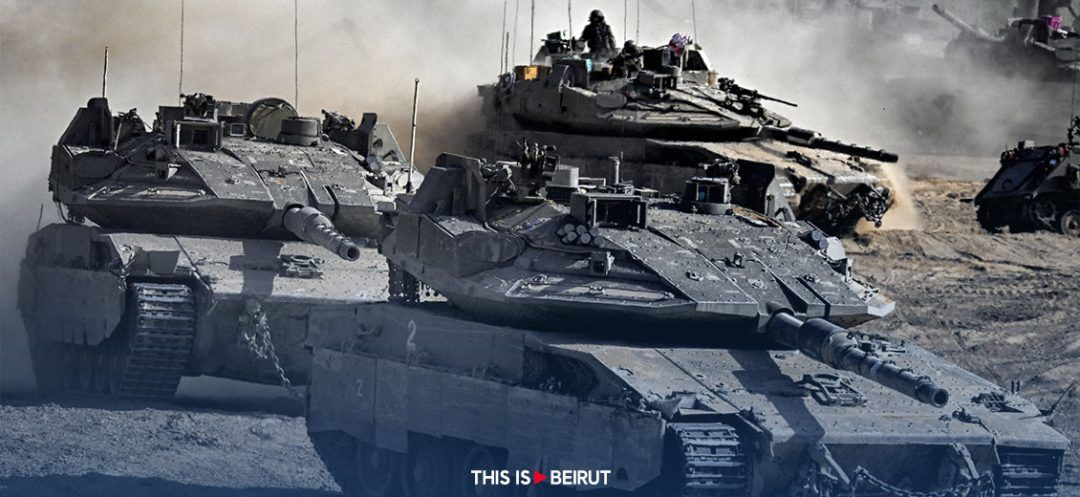- Home
- War in the Middle East
- Middle East Tense After Israel Promises Response to Iran

©(RONALDO SCHEMIDT / AFP)
Tensions were high in the Middle East on Tuesday due to traded threats by Israel and its arch-foe Iran following Iran's attack on Israel days earlier. World leaders intensified diplomatic activity, while the EU began devising sanctions on the Islamic Republic in attempts to decrease hostilities in the region.
Israel and Iran traded threats on Tuesday after Tehran's first-ever direct attack on its arch-foe sharply heightened regional tensions as the Gaza war continues with no truce in sight.
Israeli military spokesman Rear Admiral Daniel Hagari said that Iran would not get off "scot-free" after Tehran and its allies launched a barrage of over 300 missiles, drones and rockets at Israel during the weekend.
Iran said that its attack was an act of self-defense following a deadly Israeli air strike on its consulate in Syria, and that it would consider the matter "concluded" unless Israel retaliated.
Iran's President Ebrahim Raisi warned that "the slightest action against Iran's interests will definitely be met with a severe, extensive and painful response."
US President Joe Biden stressed that "the United States is committed to Israel's security" and wants to prevent the conflict from spreading.
Washington, Israel's top ally and arms supplier, made it clear that it will not join Israel in any attack on their common adversary Iran, a senior US official said.
During a phone call with Iran's Raisi, Russian President Vladimir Putin called on both sides to "prevent a new round of confrontation fraught with catastrophic consequences for the entire region," the Kremlin said.
UK Prime Minister Rishi Sunak warned his Israeli counterpart Benjamin Netanyahu against "significant escalation" and said that now was a moment for "calm heads to prevail."
Israel Weighs Options
Since the Iranian attack, Netanyahu has twice convened his war cabinet, set up after Palestinian militant group Hamas launched the October 7 attack that sparked the bloodiest ever Gaza war.
Israel was weighing its options after the Iranian drone and missile onslaught, which caused little damage as Israeli defenses intercepted most projectiles, helped by US, British and French forces as well as regional allies.
Israeli Foreign Minister Israel Katz called for more sanctions to be imposed on Iran.
[readmore url="https://thisisbeirut.com.lb/wp-admin/post.php?post=246269&action=edit"]
The European Union's foreign policy chief Josep Borrell said that Brussels was starting work on expanding sanctions on Tehran, while US Treasury Secretary Janet Yellen said that Washington would "not hesitate" to tighten sanctions.
[readmore url="https://thisisbeirut.com.lb/wp-admin/post.php?post=246382&action=edit"]
'No Change' in Gaza Aid
Israel has been facing growing global opposition to the relentless fighting that turned vast areas of Gaza to ruins and triggered a dire humanitarian crisis in Gaza.
The United Nations agency for Palestinian refugees, UNRWA, said that there had been "no significant change" in the amount of humanitarian relief entering Gaza, even after the International Court of Justice ordered Israel to allow in more aid.
The United Nations said that it would launch an appeal on Wednesday for $2.8 billion to help Gaza, as well as the West Bank. Its humanitarian office, OCHA, said that it had planned to raise $4 billion, but slashed the target due to the difficulty of getting aid to Gazans.
Also on Tuesday, UN Women said that six months into the war, 10,000 Palestinian women had been killed, including 6,000 mothers. More than 19,000 children had been left orphaned, the agency said.
In Gaza City, Wissam Dawad was one of hundreds who waited in line for hours to get bread from a newly reopened bakery.
"When Israel prevented us from getting flour, we started eating corn and barley, until it reached the point where we had to eat some animal feed," he told AFP.
Israel and Iran traded threats on Tuesday after Tehran's first-ever direct attack on its arch-foe sharply heightened regional tensions as the Gaza war continues with no truce in sight.
Israeli military spokesman Rear Admiral Daniel Hagari said that Iran would not get off "scot-free" after Tehran and its allies launched a barrage of over 300 missiles, drones and rockets at Israel during the weekend.
Iran said that its attack was an act of self-defense following a deadly Israeli air strike on its consulate in Syria, and that it would consider the matter "concluded" unless Israel retaliated.
Iran's President Ebrahim Raisi warned that "the slightest action against Iran's interests will definitely be met with a severe, extensive and painful response."
US President Joe Biden stressed that "the United States is committed to Israel's security" and wants to prevent the conflict from spreading.
Washington, Israel's top ally and arms supplier, made it clear that it will not join Israel in any attack on their common adversary Iran, a senior US official said.
During a phone call with Iran's Raisi, Russian President Vladimir Putin called on both sides to "prevent a new round of confrontation fraught with catastrophic consequences for the entire region," the Kremlin said.
UK Prime Minister Rishi Sunak warned his Israeli counterpart Benjamin Netanyahu against "significant escalation" and said that now was a moment for "calm heads to prevail."
Israel Weighs Options
Since the Iranian attack, Netanyahu has twice convened his war cabinet, set up after Palestinian militant group Hamas launched the October 7 attack that sparked the bloodiest ever Gaza war.
Israel was weighing its options after the Iranian drone and missile onslaught, which caused little damage as Israeli defenses intercepted most projectiles, helped by US, British and French forces as well as regional allies.
Israeli Foreign Minister Israel Katz called for more sanctions to be imposed on Iran.
[readmore url="https://thisisbeirut.com.lb/wp-admin/post.php?post=246269&action=edit"]
The European Union's foreign policy chief Josep Borrell said that Brussels was starting work on expanding sanctions on Tehran, while US Treasury Secretary Janet Yellen said that Washington would "not hesitate" to tighten sanctions.
[readmore url="https://thisisbeirut.com.lb/wp-admin/post.php?post=246382&action=edit"]
'No Change' in Gaza Aid
Israel has been facing growing global opposition to the relentless fighting that turned vast areas of Gaza to ruins and triggered a dire humanitarian crisis in Gaza.
The United Nations agency for Palestinian refugees, UNRWA, said that there had been "no significant change" in the amount of humanitarian relief entering Gaza, even after the International Court of Justice ordered Israel to allow in more aid.
The United Nations said that it would launch an appeal on Wednesday for $2.8 billion to help Gaza, as well as the West Bank. Its humanitarian office, OCHA, said that it had planned to raise $4 billion, but slashed the target due to the difficulty of getting aid to Gazans.
Also on Tuesday, UN Women said that six months into the war, 10,000 Palestinian women had been killed, including 6,000 mothers. More than 19,000 children had been left orphaned, the agency said.
In Gaza City, Wissam Dawad was one of hundreds who waited in line for hours to get bread from a newly reopened bakery.
"When Israel prevented us from getting flour, we started eating corn and barley, until it reached the point where we had to eat some animal feed," he told AFP.
Read more



Comments